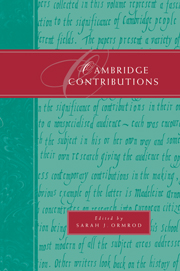Book contents
- Frontmatter
- Contents
- Notes on contributors and contributions
- Preface
- 1 Some Cambridge contributions to astronomy and cosmology
- 2 Cambridge's contribution to medical science
- 3 Cambridge and the study of English
- 4 The Cambridge contribution to economics
- 5 ‘Nasty forward minxes’: Cambridge and the higher education of women
- 6 Cambridge Classics for the third millennium
- 7 Cambridge contributions: the philosophy of science
- 8 European citizenship and education
- 9 The University Botanic Garden
- 10 Geophysics in Cambridge: extinct and active volcanoes
- 11 Cambridge spies: the ‘Magnificent Five’, 1933–1945
11 - Cambridge spies: the ‘Magnificent Five’, 1933–1945
Published online by Cambridge University Press: 31 December 2009
- Frontmatter
- Contents
- Notes on contributors and contributions
- Preface
- 1 Some Cambridge contributions to astronomy and cosmology
- 2 Cambridge's contribution to medical science
- 3 Cambridge and the study of English
- 4 The Cambridge contribution to economics
- 5 ‘Nasty forward minxes’: Cambridge and the higher education of women
- 6 Cambridge Classics for the third millennium
- 7 Cambridge contributions: the philosophy of science
- 8 European citizenship and education
- 9 The University Botanic Garden
- 10 Geophysics in Cambridge: extinct and active volcanoes
- 11 Cambridge spies: the ‘Magnificent Five’, 1933–1945
Summary
Spies are a Cambridge tradition. Elizabeth I's Secretary of State, Sir Francis Walsingham, a graduate of King's, ran and largely financed a small, underpaid secret service which uncovered the Ridolfi and Babbington plots, provided the evidence which sent Mary Queen of Scots to the scaffold, and finally drove Walsingham himself to the verge of bankruptcy. Among Walsingham's spies was Corpus Christi's most famous poet and playwright, Christopher Marlowe, who absentmindedly left Cambridge without paying his college bill and was killed in a tavern brawl at the age of twenty-eight while on Her Majesty's secret service.
The most celebrated of the Cambridge recruits to the twentieth-century intelligence community have been the codebreakers. When Bletchley Park, the Second World War signals' intelligence centre, decided it needed an influx of ‘men of the professor type’ to crack the German ‘Enigma’ machine cipher and solve other cryptanalytic conundrums, it turned chiefly to Cambridge. One-third of the King's Fellowship served at Bletchley during the Second World War, among them Alan Turing, the chief inventor in 1943 of the world's first electronic computer, codenamed ‘Colossus’. Some of the Cambridge dons at Bletchley, arguably the most successful intelligence agency in modern history, found themselves upstaged by undergraduates. Sir Harry Hinsley, later Master of St John's, Vice-Chancellor and official historian of British intelligence during the Second World War, was recruited in the autumn of 1939, just as he was about to begin work for Part II of the Historical Tripos.
- Type
- Chapter
- Information
- Cambridge Contributions , pp. 208 - 228Publisher: Cambridge University PressPrint publication year: 1998
- 1
- Cited by



